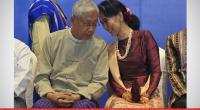 James Gambone distinctly remembers the evening of November 17 last year. CNN had just aired an interview with a midwife in Bangladesh where she described the plight of Rohingya women, who had been brutally raped and assaulted while fleeing violence in Myanmar’s Rakhine state.
James Gambone distinctly remembers the evening of November 17 last year. CNN had just aired an interview with a midwife in Bangladesh where she described the plight of Rohingya women, who had been brutally raped and assaulted while fleeing violence in Myanmar’s Rakhine state.
International news media was then flooded with stories of Rohingya Muslims fleeing their homes to escape what a United Nations report called ‘well-organised, coordinated and systematic’ violence. Majority of them found shelter in neighbouring Bangladesh that was struggling to cope with this massive influx of refugees.
Mr Gambone, a professor at Capella University in Minneapolis, too, had heard the gut-wrenching stories and was familiar with the scale of the disaster but during the interview, the midwife said something that left him deeply disturbed.
“I heard her say that many of the women and girls at the camp were still wearing the same clothes they had been raped in,” says Mr Gambone.
The fact that these women not only had to live with the trauma of rape but also woke-up in the same clothes every morning that reminded them of their assault, hit him the most.
“I thought I can't do much but can I at least get them a change of clothes?” he says. Some research and several phone calls later, he came across Action Aid, an NGO that works in 45 countries all over the world, and is strongly focused on women’s issues.
Some research and several phone calls later, he came across Action Aid, an NGO that works in 45 countries all over the world, and is strongly focused on women’s issues.
ActionAid was already providing women at Bangladesh’s Cox’s Bazar refugee camp with Dignity Kits that contained a change of clothes, shawls, sanitary napkins, underwear and a few other things packed in a bucket but there was no project specifically focused on rape victims.
ActionAid’s communication director Chris Coxon says the project was unique and so they really happy to partner with him.
“His idea fits nicely with what we were trying to do,” says Mr Coxon.
It's believed there are nearly 4,000 rape survivors living in the refugee camps of Bangladesh and many haven't shared their plight because of the stigma attached to it.
“Each kit costs 25 US dollars and so my target is to generate 100,000 dollars,” he says. The kits are purchased in Bangladesh to help the local economy.
Last week, Mr Gambone hosted a fundraiser to launch "Project Dignity" at a local restaurant in Minneapolis where he was joined by ActionAid’s executive director Marie Clarke.
ActionAid’s website has now created a special link for the project where people are being urged to support his efforts.
The professor now devotes at least 90 minutes each day to mobilise support but to take it to the next level he now plans to approach various faith groups in Minneapolis.
“If every church, mosque and synagogue here sponsors just 10 kits, we can get really close to the target,” he says.
Nearly one million Rohingya refugees live in substandard overcrowded settlements in Cox’s Bazar and the UN Aid agencies are now seeking close to a billion dollars for humanitarian support.
Mr Gambone realises that as an individual he can do ‘very little’, but hopes it will be worth it.
 International
International
41344 hour(s) 41 minute(s) ago ;
Morning 11:35 ; Saturday ; Jul 05, 2025
American professor's bid to help Rohingya rape survivors
Send
Brajesh Upadhyay (Washington)
Published : 17:59, Mar 22, 2018 | Updated : 18:02, Mar 22, 2018
Published : 17:59, Mar 22, 2018 | Updated : 18:02, Mar 22, 2018
0 ...0 ...
/FU/PDN/
Topics: Top Stories
- KOICA donates medical supplies to BSMMU
- 5 more flights to take back British nationals to London
- Covid19: Rajarbagh, Mohammadpur worst affected
- Momen joins UN solidarity song over COVID-19 combat
- Covid-19: OIC to hold special meeting
- WFP begins food distribution in Cox’s Bazar
- WFP begins food distribution in Cox’s Bazar
- 290 return home to Australia
- Third charter flight for US citizens to return home
- Dhaka proposes to postpone D8 Summit
Unauthorized use of news, image, information, etc published by Bangla Tribune is punishable by copyright law. Appropriate legal steps will be taken by the management against any person or body that infringes those laws.
Bangla Tribune is one of the most revered online newspapers in Bangladesh, due to its reputation of neutral coverage and incisive analysis.
F R Tower, 8/C Panthapath, Shukrabad, Dhaka-1207 | Phone: 58151324; 58151326, Fax: 58151329 | Mob: 01730794527, 01730794528


